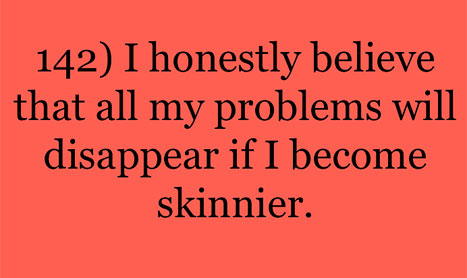COLLEGE PARK – Images of bony hipbones, concave stomachs, and quotes like “Nothing tastes as good as skinny feels” are popping up on social networks.
The images are part of a new Internet phenomenon – “Thinspiration” – that young women with eating disorders are using to support their unhealthy lifestyles.
Instead of seeking medical treatment, a growing community of anorexics and bulimics are using the Web to encourage each other to starve themselves, vomit after eating and over-exercise.
Social networks like Facebook, Pinterest and Tumblr are working to block Thinspiration content. Despite these efforts, the harmful images and quotes persist.“These sites are started and frequented by people who are usually very deep into an eating disordered mindset,” said Claire Mysko, a project consultant for the National Eating Disorder Association.
As many as 10 million women and 1 million men suffer from anorexia or bulimia in the United States, according to NEDA.
Thinspiration content, which advocates said prevents anorexics and bulimics from seeking treatment, includes images of extremely thin people and quotes encouraging eating disorders and excessive exercise. Some people with eating disorders also obsessively document their weight loss online.
“These websites, in a way, promote damaging behaviors, such as extreme weight loss, vomiting and using laxatives,” said Scarlet Hemkes, creator of Proud2BMe, a site that promotes healthy body image and helps teenage girls recover from eating disorders.
Hemkes suffered from anorexia and bulimia for about 10 years before seeking treatment.
Before the advent of social networks and message boards, anorexics and bulimics generally kept their disease private. The Web has enabled them to seek encouragement and advice from others while remaining anonymous.
Strong communities that define themselves as “pro-ana” – for anorexics – and “pro-mia” – for bulimics — have become prominent.
“If you visit a website or blog like that you get the idea that you can only be successful as a female if you are skinny. That’s cruel, stupid and very untrue,” Hemkes said.
Though eating disorders affect people from all demographics, teenage girls make up the majority of these online communities, Mysko said.
“People who are suffering from eating disorders are feeling very isolated and very ashamed, so these communities provide a sense of community, but they do it in all the wrong ways. They’re keeping people very stuck in dangerous and unhealthy behaviors,” Mysko said.
Extreme thinness is often glorified in American popular culture. Images and descriptions of skinny women have always existed in books, magazines, and movies. But social media has made them more widely available.
Jenni Schaefer, who suffered from an eating disorder before thinspiration images appeared online, said the Web communities would have made her recovery more difficult.
“I never participated in these communities because when I got into recovery, it was 1999. So the Internet wasn’t the big thing quite yet,” Schaefer said. “I think that I could have easily been sucked into these communities and to some of these negative behaviors and the tips and tricks that they provide.”
Peer influence – both online and off – can be a big driver of unhealthy eating habits.
American culture, and more specifically, the culture on college campuses, encourages young women to go to extremes to be thin, said Jane Jakubczak, the University of Maryland College Park’s campus dietitian.
“Now you take that [culture] to social media sites, and in a way, you’re expanding that infection. That may be a strong term, but I only see it growing,” Jakubczak said.
Thinspiration images are rampant on Reddit, a fast-growing social network, which has multiple sub-reddits, or channels, dedicated to unhealthy images and quotes, including r/thinspo. The site also has a sub-reddit dedicated to eating disorders, r/EatingDisorders.
“I spent hours a day looking at diet tips, fad diets, pictures of skinny girls, low-cal recipes. And I constantly, constantly looked at pictures of food. Food I couldn’t eat,” said anorectic99, a redditor from Texas, in response to a query from Capital News Service.
Five months after discovering “pro-ana” blogs on Tumblr, anorectic99, who said she was 5 foot 5 inches tall, had dropped from 140 pounds to 110 pounds.
Capital News Service was unable to find members of thinspiration communities willing to talk on the record.
Websites and some social media companies are actively working to stop the spread of these messages, eating disorder awareness advocates said.
In addition to partnering with Proud2BMe, NEDA has also worked closely with Tumblr and Facebook to block users from posting thinspiration content on their networks.
“We’re trying to raise awareness about the serious consequences of these sites and the ripple effect that’s happening in social media,” Mysko said.
People who suffer from anorexia are 18 times more likely to die early compared with people their age who do not suffer from the illness, according to a National Institute of Mental Health report.
“I think sometimes people feel like there is this love and support coming from these people online, when in reality, its not love or support. It’s people encouraging extremely negative behaviors, when – you could die,” Schaefer said. “I know too many people who have died from anorexia and bulimia, and eating disorders in general.”
Some thinspiration images and quotes are disguised as harmless motivation to get healthy and get to the gym. But advocates said everyone should embrace their individuality in terms of shape and size.
“Even for someone who doesn’t have a tendency towards eating disorders, using someone else’s body for motivation is still an unhealthy way of going about it,” Jakubczak said.
“I think there are a lot of people out there who are really suffering who aren’t clinically diagnosed with an eating disorder,” Jakubczak said. “Those are the ones that these sites and the social media are nurturing and keeping them in that dissatisfied, dysfunctional thinking.”

